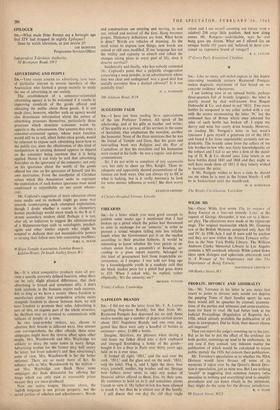ADVERTISING AND PEOPLE SIR,—Your recent articles on advertising have been
of particular interest to certain members of this Association who formed a group recently to study the use of advertising in our society.
The establishment of a consumer-orientated advertising agency is to be welcomed if it results in improving standards of the goods offered and educating the public about those goods. It is not made clear, however, whether such an agency would also disseminate information about the nature of advertising processes themselves, particularly those processes which stimulate consumer wants by appeals to the subconscious. One assumes that even a consumer-orientated agency, whose main function would still be to sell, albeit better-class goods, would be reluctant to expose such advertising know-how to the public eye, since the effectiveness of this kind of manipulation in creating demand appears to depend on the consumer being unaware that it is being applied. Hence it can truly be said that advertising flourishes on the ignorance of the consumer, not only on his ignorance about the worth of the goods offered but also on his ignorance of himself and his own motivation. From the standpoint of Christian values which this Association seeks to represent the exploitation of such human ignorance must stand condemned as unjustifiable on any count whatso- ever.
Mr. Copland's suggestion of more education about mass media and its methods might go some way towards counteracting such attempted exploitation, though I doubt whether a course in elementary human psychology would mean much to the B or C stream secondary modern child. Perhaps it is not, after all, so ludicrous to suggest the administration of a Hippocratic-type oath to sociologists, psychol- ogists and other similar experts who might be tempted to dedicate their not inconsiderable powers to turning their fellow-men into consuming machines.
NORA S. HOUSE
William Temple Association, London Branch, Liddon House, 24 South /ulky Street, W1

































 Previous page
Previous page